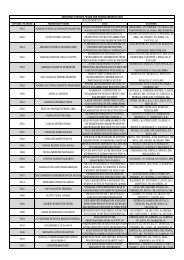immunology of infectious and parasitic diseases - XXXVII Congress ...
immunology of infectious and parasitic diseases - XXXVII Congress ...
immunology of infectious and parasitic diseases - XXXVII Congress ...
You also want an ePaper? Increase the reach of your titles
YUMPU automatically turns print PDFs into web optimized ePapers that Google loves.
Leishmania amazonensis INCREASES ECTONUCLEOTIDASES<br />
EXPRESSION IN LYMPH NODE DENDRITIC CELLS AND T REG CELLS<br />
POPULATIONS IN LESION SITES<br />
AMANDA BRAGA DE FIGUEIREDO; PRISCILA MARTINS DE SOUZA, TIAGO<br />
DONATELLI SERAFIM; LUÍS CARLOS CROCCO AFONSO<br />
Laboratório de Imunoparasitologia, Departamento de Ciências Biológicas, ICEB<br />
/ NUPEB, Universidade Federal de Ouro Preto. Ouro Preto, Minas Gerais,<br />
Brazil.<br />
Introduction: Leishmania infections can result in a wide spectrum <strong>of</strong> clinical<br />
manifestations, <strong>and</strong> the outcome <strong>of</strong> disease is determined by parasite species<br />
<strong>and</strong> the host immune response. Dendritic cells (DC) play an essential role in the<br />
modulation <strong>of</strong> immune response <strong>and</strong> T reg cells are important in<br />
immunosuppressive response, including during Leishmania infection.<br />
Extracellular-ATP exhibits pro-inflammatory properties whereas adenosine is an<br />
important anti-inflammatory mediator. Our objective was to investigate the DC<br />
activation, the ectonucleotidases expression in these cells <strong>and</strong> the generation <strong>of</strong><br />
T reg cells after Leishmania infection. Methods <strong>and</strong> Results: C57BL/6J mice<br />
were inoculated on ears with 1 x 10 5 CFSE-labelled metacyclic promastigotes <strong>of</strong><br />
L. amazonensis, L. braziliensis or L. major. Draining lymph nodes <strong>and</strong> ears<br />
were isolated after 20 h, 1 <strong>and</strong> 3 weeks <strong>and</strong> cells were stained <strong>and</strong> analyzed by<br />
flow cytometry. After 20 h <strong>of</strong> infection with L. amazonensis, L. braziliensis or L.<br />
major, approximately 12% <strong>of</strong> lymph node cells were found to be CD11c + <strong>and</strong> <strong>of</strong><br />
these CD11c + cells 10% were infected. The expression <strong>of</strong> MHCII, CD86 <strong>and</strong><br />
CD40 was significantly higher in lymph node infected-DC, regardless <strong>of</strong> the<br />
strain <strong>of</strong> Leishmania used. Interestingly, the infection increases<br />
ectonucleotidases expression in DC <strong>and</strong> at least 50% <strong>of</strong> infected cells coexpressed<br />
CD39 <strong>and</strong> CD73, independent <strong>of</strong> the parasite species used. L.<br />
amazonensis, L. braziliensis <strong>and</strong> L. major decrease the percentage <strong>of</strong> T reg<br />
cells (CD4+CD25+Foxp3+ cells) in draining lymph nodes after 1 or 3 weeks <strong>of</strong><br />
infection, but only L. amazonensis increases the percentage <strong>of</strong> these cells in<br />
lesion sites after 3 weeks <strong>of</strong> infection. Conclusion: In conclusion, L.<br />
amazonensis increases ectonucleotidases expression in lymph node DC <strong>and</strong> T<br />
reg cells populations in lesion sites.



